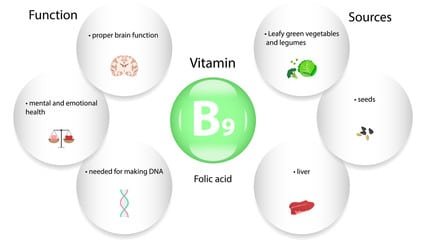If you’re thinking of getting pregnant, or if you’re already pregnant, chances are your OBGYN has discussed the crucial value of folic acid with you. You may also have learned of folate’s crucial value too. Folic acid and folate may even have been used interchangeably at times-but are they the same and are they providing the same benefits?
What Folic Acid and Folate Have in Common
First of all, a little information about these important nutrients. They are both forms of vitamin B9, a water-soluble member of the B-complex vitamin family (folic acid and folate). The B vitamins work together to promote healthy nerve function, digestion, red blood cell production, and improve the energy supply of the body.
Folic acid and folate have been proven to be effective in supporting a healthy pregnancy. It’s vital to the body’s growth and development, they help play an important role in supporting healthy cell division, DNA synthesis3, and neural tube development.
How are Folic Acid and Folate Different

Folic acid is the man-made form of vitamin B9 and is often used to fortify food like bread and cereals – and is often featured in comprehensive prenatal multivitamins.
Folate is the naturally-occurring form of vitamin B9 and is found in dark, leafy greens like spinach, kale, and romaine lettuce; cruciferous vegetables such as Brussels sprouts, rapini, and cauliflower; and fruits including oranges, grapefruit, and strawberries.
Folic acid and folate help the body produce new healthy red blood cells. Red blood cells carry oxygen to all parts of your body. If your body doesn’t make enough red blood cells, you can develop anemia. Anemia happens if your blood can’t carry enough oxygen to your body, leaving you pale, tired, or weak. Sometimes, if you don’t get enough folic acid, you may develop anemia called folate-deficiency anemia.
Recommended Dosage
Ideally, supplement a diet already rich in folate with a daily prenatal vitamin or folic acid to help satisfy your needs and the needs of your baby
CDC urges women to take 400 mcg of folic acid every day, starting at least one month before getting pregnant, to help prevent major birth defects of the baby’s brain and spine.
Why is folic acid important for pregnant women?
For all women who may become pregnant, folic acid is very necessary. Adequate folate intake during the periconceptional phase protects against neural tube defects just before and during pregnancy.
The Centers for Disease Control (CDC) recommends taking folic acid daily for at least one month before conception and during your pregnancy, preferably weekly. The CDC also suggests that women of childbearing age take folic acid daily, whether they plan a pregnancy or not, as almost half of all pregnancies are unplanned in the United States. This makes it important to get enough folic acid – whether or not you intend to get pregnant.
References
- Vitamin B6 (Pyridoxine), University of Maryland Medical Center, Upper Chesapeake Health online:https://umuch.org/health/medical/altmed/supplement/vitamin-b6-pyridoxine
- Kamen B. Folate and antifolate pharmacology. Semin Oncol.1997 Oct;24(5 Suppl 18): S18-30-S18-39.
- Wilson RD, Davies G, Désilets V, Reid GJ, et al. The use of folic acid for the prevention of neural tube defects and other congenital anomalies. J Obstet Gynaecol Can. 2003 Nov;25(11):959-73.
- Abridged from Folate, Office of Dietary Supplements, National Institutes of Health.https://extensiononline.tamu.edu/online_course_material/Course371/file/Folate-Handout.pdf
